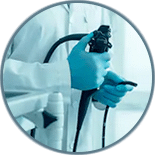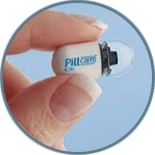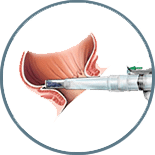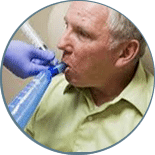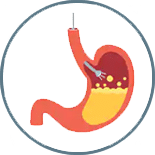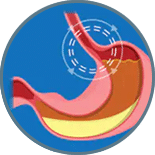Digestive Health Services We Offer
Our expertise is in providing digestive health services to help diagnose or treat symptoms or conditions involving the GI tract and liver. Dr. Islam has distinguished himself amongst Lubbock gastroenterologists through his fellowship training, work experience, and by integrating a functional approach to his style of medicine.
- Dr. Islam strives to find the cause of your symptoms and provide answers to his patient’s questions
- Our goal is to get you off of medications when possible by exploring natural therapy options
Below are the most common services we provide at Lubbock Gastroenterology. Please contact us at 806-696-4440 if you need additional information or would like to schedule an appointment.
Colonoscopy FAQs
What is a colonoscopy?
A colonoscopy is a procedure that examines your colon, or large intestine. This procedure uses a long, flexible tube with a light and camera. A diagnostic colonoscopy can diagnose and treat digestive symptoms including:
- Abdominal pain
- Blood in the stool
- Change in bowel habits
- Narrowing of the stool
A screening colonoscopy inspects your colon for colon cancer. This procedure is the gold standard for colon cancer screening because it can remove precancerous polyps.
What does colonoscopy diet prep involve?
Colonoscopy diet prep involves eating a low-fiber diet for 3 days before your procedure. This reduces your stool bulk and makes cleansing your bowels easier. The day before your procedure, you will follow a clear liquid diet and take the prescribed laxatives. This will empty your bowels so that the camera can clearly visualize the inner lining of your colon.
Following your colonoscopy diet prep can improve the detection rate of colon polyps and other abnormalities. If you don’t follow your prep, you will need to reschedule your procedure.
What are quality indicators for colonoscopy?
Quality indicators for colonoscopy measure a doctor’s skills and thoroughness when performing a colonoscopy. Quality indicators for colonoscopy include:
- Adenoma detection rate (ADR). This is the average number of polyps your gastroenterologist finds and removes during the colonoscopy.
- Cecal withdrawal time. This is the amount of time your gastroenterologist spends looking for colon polyps when removing the scope.
According to the American Society for Gastrointestinal Endoscopy (ASGE), the accepted average ADR and withdrawal times are:
Adenoma Detection Rate: 25%
Withdrawal Time: 6 minutes
Dr. Sameer Islam’s average adenoma detection rate and withdrawal times are well above the accepted average. They are:
Adenoma Detection Rate: 55%
Withdrawal Time: 6.98 minutes
This means that Dr. Sameer Islam removes more polyps and also spends more time carefully completing the procedure. Receiving a high-quality colonoscopy can reduce your risk for colon cancer.
How long does a colonoscopy take?
A colonoscopy takes 20-45 minutes. You’ll stay at the endoscopy center for 1-2 hours after your colonoscopy to recover from the anesthesia. You’ll then need someone to drive you home. The anesthesia will completely wear off after 24 hours.
When should you get a colonoscopy?
Everyone age 45+ should receive a colonoscopy. For individuals at average risk for colon cancer, colon cancer screening should begin at age 45. But you should start screening earlier if you have:
- Family history of colorectal cancer or polyps
- Personal history of colorectal cancer or polyps
- Personal history of inflammatory bowel disease (Crohn’s disease, ulcerative colitis)
- Family history of hereditary colon cancer syndrome (familial adenomatous polyposis, Lynch syndrome)
- Personal history of radiation to the abdomen or pelvis
How often should you have a colonoscopy?
For individuals at average risk for colon cancer, a colonoscopy is recommended every 10 years. If you have an increased risk for colon cancer, you may need to have a colonoscopy more often.
Is a colonoscopy painful?
A colonoscopy is not painful. This is because you receive anesthesia before your procedure. The anesthesia puts you in a deep sleep and prevents you from feeling anything. After your procedure, you may experience mild discomfort such as:
- Abdominal cramping
- Bloating
- Gas pains
What does a colonoscopy cost?
A screening colonoscopy is usually covered by insurance 100%. But copays and deductibles often apply to a diagnostic colonoscopy. You should always confirm your insurance benefits before your appointment.
What are the potential complications of colonoscopy?
A colonoscopy is a safe procedure with few risks. Potential complications of colonoscopy may include:
- Bleeding
- Infection
- Reaction to the anesthesia
- Perforation or tearing of the colon wall

